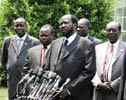
Earlier this week, a draft of South Sudan’s transitional constitution was made public and submitted to South Sudan President Salva Kiir for his review. Once finalized, the document will serve as the guiding legal document for the new republic during its critical transitional phase. The contents of the draft, amended by an SPLM-dominated committee, have left some opposition members angry; one leader called the document a “dictatorial” move by the SPLM to maintain its monopoly on power.
These initial reactions are a sign that distrust of the ruling party’s intentions, which has grown in recent months, has yet to dissipate. How the ruling party manages the review and approval process going forward will continue to feed into popular perception of how inclusive the SPLM will be come July 9, important not in the least because of the many militia groups that have emerged on the basis of ending the SPLM’s “politics of exclusion.”
Several key amendments in the draft have become public points of contention, including:
Presidential term and limit: The draft establishes the tenure of South Sudan’s president as four years starting on July 9, 2011, instead of from 2010 when Kiir’s current term began, and removes the two-term limit previously in place. The terms for national and state legislative members also begin on July 9 for a period of four years, suggesting that the transitional period is four years. Opposition parties argue that the transitional period should last between 18 and 21 months. Opposition leader Lam Akol told Reuters, “[The technical committee] said they would just be removing redundant language that reflects a regional constitution becoming a national one, but they have set the president's term without mentioning limits.”
Composition of legislature: The draft creates a second legislative chamber, the Council of States, in addition to the already existing national assembly. It also says that the current assembly will be expanded to accommodate the 96 southern members of the national legislature in Khartoum who are returning. The 20 southerners who were serving in the council at the national level will fill the seats in the Council of States; Kiir will appoint 20 other representatives. Opposition members have argued that seats in the transitional government at all levels should be divided in half between the SPLM and the other parties and that the size of the national assembly should not change.
Should the draft be left as is, non-SPLM parties would have marginal participation in the national assembly during the transitional phase. President Kiir could feasibly appoint opposition members to some of the 20 open seats in the Council of States and even to ministerial offices—in a move that could reassure opposition members that the SPLM does in fact intend to form a broad-based government. The removal of presidential term limits though, coupled with the fact that the length of the transitional period is never specified, has raised concerns over SPLM intent.
Significantly, the draft constitution does appear to commit the ruling party to a widely consultative process to write South Sudan’s permanent constitution, which will take place throughout the transitional period. The draft says that the committee writing the constitution should be representatively diverse and meet consultation and civic education obligations, and that a broadly representative national constitutional conference would also deliberate over the text.
The main question now is whether a national conversation is allowed to take place on the transitional constitution. Will opposition, civil society, and the general populace be given an opportunity to voice their opinions on the draft constitution and will the technical committee take the time to explain its decisions? The Political Parties’ Leadership Forum, comprised of leaders of South Sudan’s political parties, is currently convening on the content of the constitution but it will have little time to do so. Legally, the constitution must be submitted to the legislative assembly for a two-month review in early May. At that point, the question will then become whether the legislative assembly decides to consult with stakeholders during its review. Stay tuned.
Photo: President Salva Kiir and with other South Sudanese government officials

